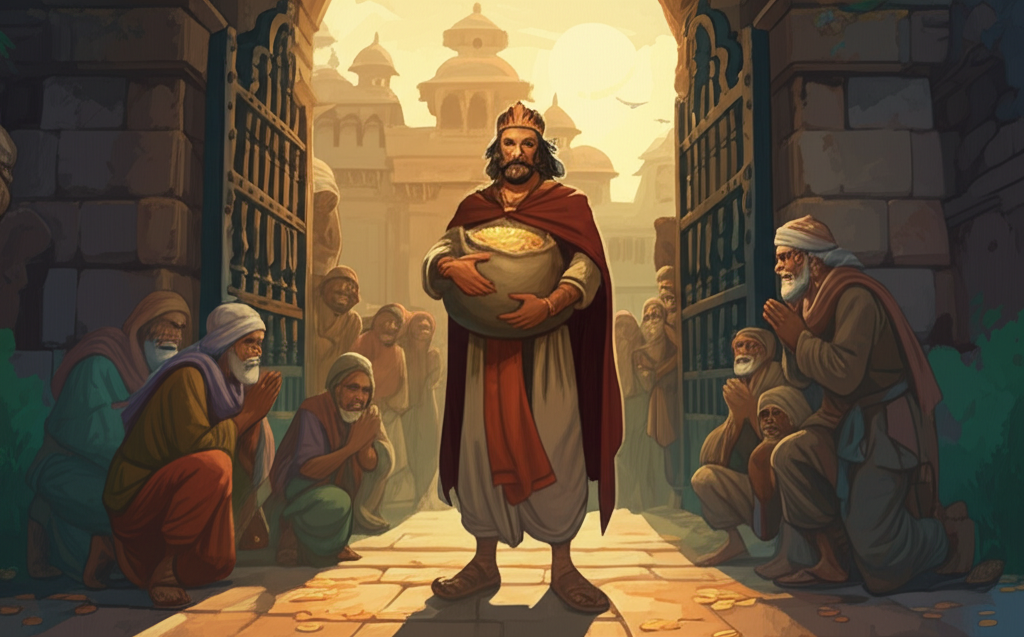
Once upon a time, there was a kind king named King Harichand. Every morning, before he took his bath and ate breakfast, he would give away a big pile of gold to the poor people in his kingdom. He did this because he loved God and believed God had given him everything he had. So, he wanted to share some of it back with God.
Now, God heard how good King Harichand was and how much the king loved him. God decided to visit the king and see if everything people said about him was true. So, he dressed up as a poor traveler and went to King Harichand’s palace. The king had already given away his gold for the day and had finished his bath and breakfast. When the king’s helpers told him there was another traveler at the gate, the king said, “Tell him to come back tomorrow. I’ve already taken my bath and eaten, so I can’t see him now.” The helpers went back to the traveler and said, “The king says you have to come back tomorrow because he can’t see you now.” God left, and the next day he came again, but it was after the king had given away all the gold and gone back inside. The king told his helpers, “Tell the traveler to come back tomorrow. He’s always too late to see me.”
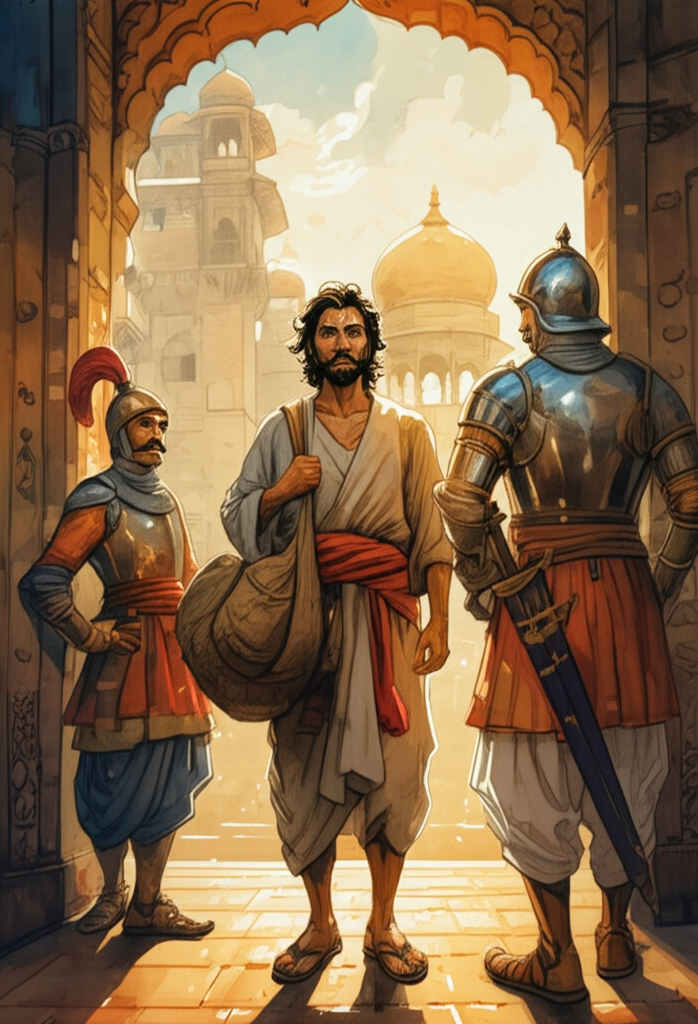
On the third day, God was late again! The king was a little annoyed that the traveler was always late. He said to his helpers, “What kind of traveler is this who always comes too late? Go ask him what he wants.” So the helpers went to the traveler and asked, “King Harichand wants to know what you want from him?” “I don’t want money or anything else,” God answered. “I want him to give me his wife!” The helpers told this to the king, and it made him very angry. He went to his wife, Queen Bahan, and said, “There’s a traveler at the gate who wants me to give you to him! Can you believe it? I would never do that!”
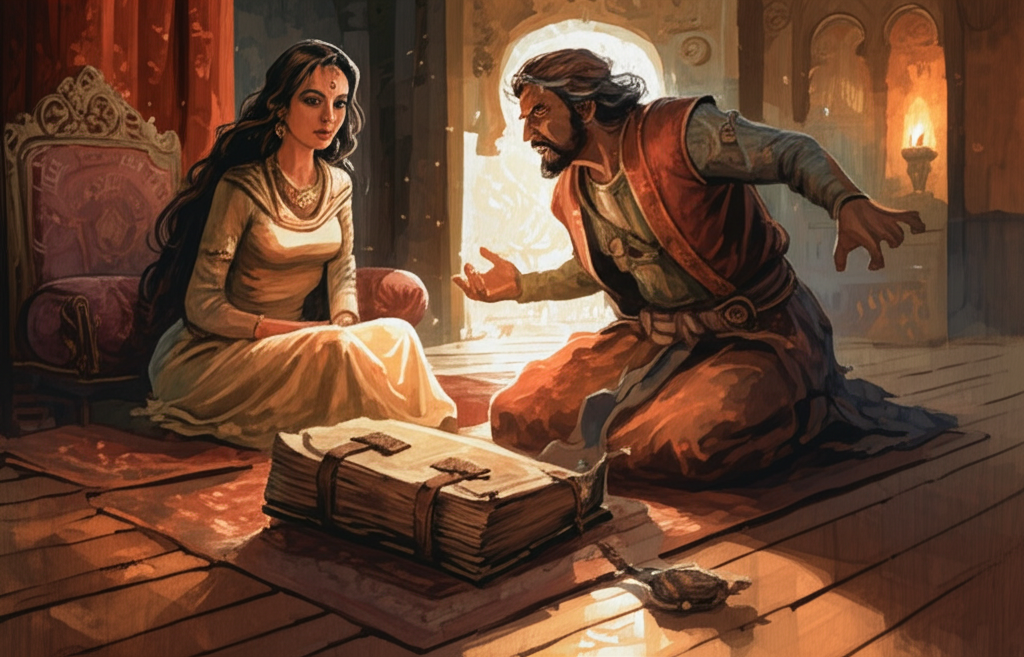
The Queen was very smart. She had a special book that told her everything. She knew that the traveler at the gate was not just a traveler, but God himself! (A long, long time ago, some people could read this book, but now it’s so hard that almost no one can.) So the Queen said to the King, “Go to this traveler and say, ‘You can have my wife.’ But you don’t really have to give me to him. Just say it in your mind.” “No way!” the King said angrily. Even though she begged him, he wouldn’t say it. Instead, he told his helpers to beat up the traveler and send him away, and that’s what they did.
God went back to his special place and called two angels. “Pretend to be men,” he told them. “Go to King Harichand and say, ‘God sent us to you. He wants to know, would you rather have no rain for twelve years, or a big storm that lasts for twelve hours?’”
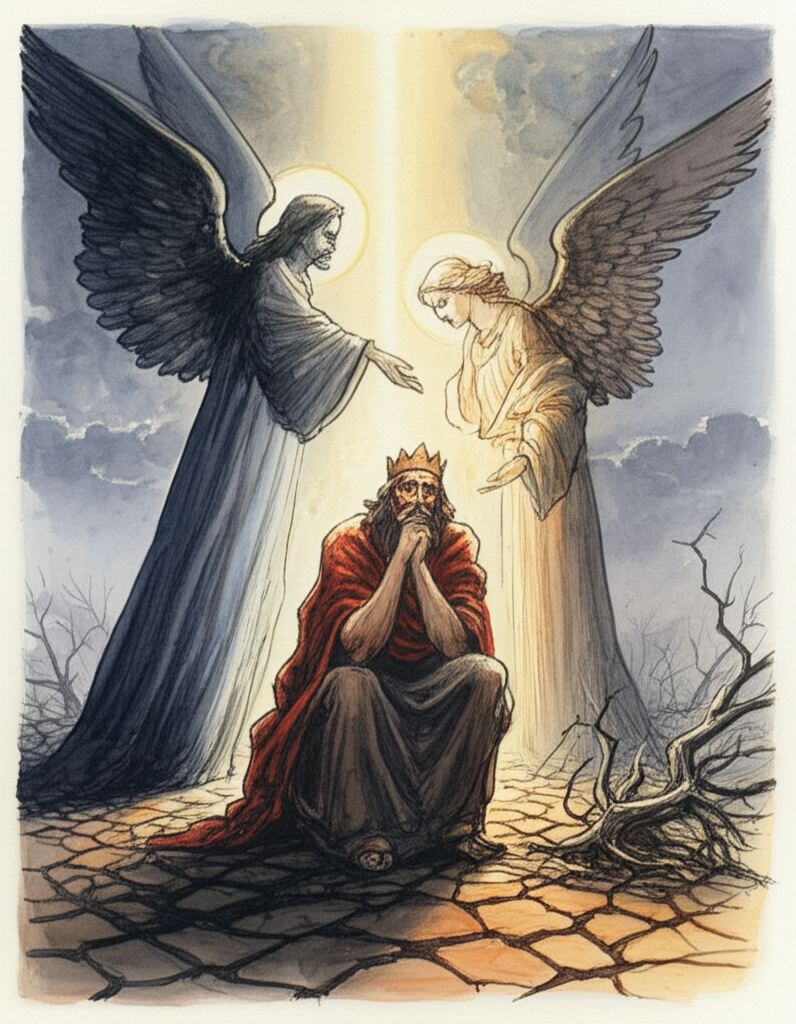
The angels went to the King and told him what God had said. The King thought for a long time. “If there’s a big storm for twelve hours,” he thought, “my whole kingdom will be washed away! But I have lots of gold. I can send it to other countries and buy food for my people during the twelve years with no rain.” So he said to the angels, “I’ll choose no rain.” Then the angels went into his palace. As soon as they entered, all the King’s helpers, cows, horses, elephants, and other animals turned to stone! Everything in the palace turned to stone too, except for his gold and silver, which turned into black charcoal. Only the King and Queen didn’t turn to stone.
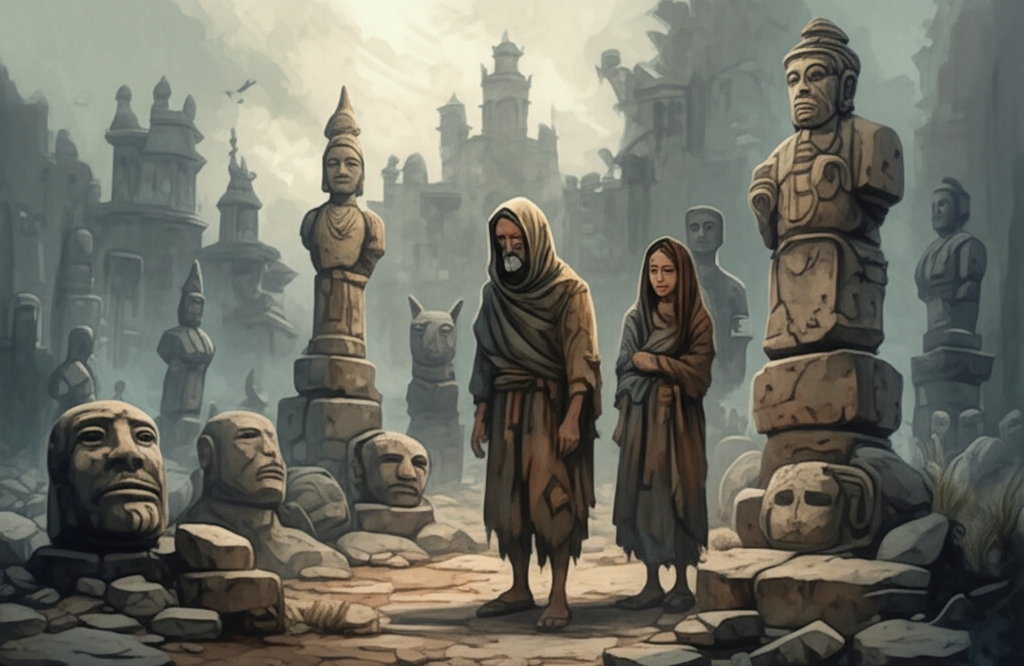
The angels said to them, “For three weeks, you won’t be able to eat anything. You can’t eat any food you find or that anyone gives you. But don’t worry, you won’t die, you’ll stay alive.” Then the angels left.
The King was very sad when he looked around his palace and saw everything turned to stone, and all his gold and silver turned to charcoal. He said to his wife, “I can’t stay here. We have to go to another country. I was a great king, how can I ask my people to give me food? Let’s dress up like poor travelers and go somewhere else.”
They put on poor travelers’ clothes and left their palace. They walked through the jungle until they saw a plum tree full of fruit. “Please get me some of those plums,” said the Queen, who was very hungry. The King went to the tree and reached out to pick the plums. But as soon as he did, all the plums floated up into the air! When he took his hand back, the plums went back to the tree. The King tried three times to pick the plums, but he couldn’t do it.
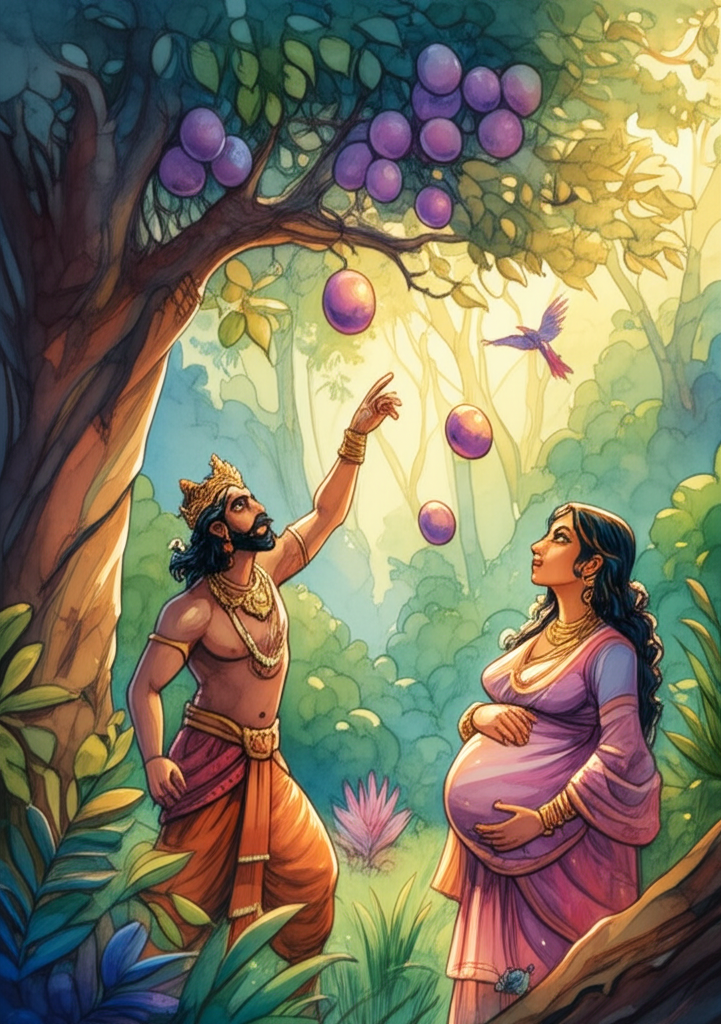
He and the Queen walked on until they came to a field in another country where people were fishing in a pond. The Queen said to her husband, “Go ask those men to give us some of their fish, I’m so hungry.” The King went to the men and said, “I’m a poor traveler and I don’t have any money. Will you give me some fish? I haven’t eaten for four days and I’m really hungry.” The men gave him some fish, and he and his wife carried it to a pond in another field. The Queen cleaned and prepared the fish for cooking. She said to her husband, “I don’t have anything to cook this fish in. Go to the town (there was a town nearby) and ask someone to give you a clay pot with a lid, and some salt.”
The King went to the town and someone in the market gave him a clay pot. A grain seller put a little salt into it. Then he went back to the Queen. They made a fire under a tree, put the fish in the pot, and set the pot on the fire. “I haven’t taken a bath in days,” said the King. “I’ll go take a bath while you cook the fish, and when I come back we can eat it.” So he went to take a bath, and the Queen sat and watched the fish. After a while, she thought, “If I leave the lid on the pot, the fish will dry up and burn.” So she took off the lid, and the fish jumped out of the pot into the pond and swam away! This made the Queen sad, but she didn’t say anything. When the King came back from his bath, he said, “Now we can eat our fish.” The Queen answered, “I hadn’t eaten for four days, and I was really hungry, so I ate all the fish!” “Never mind,” said the King, “it doesn’t matter.”
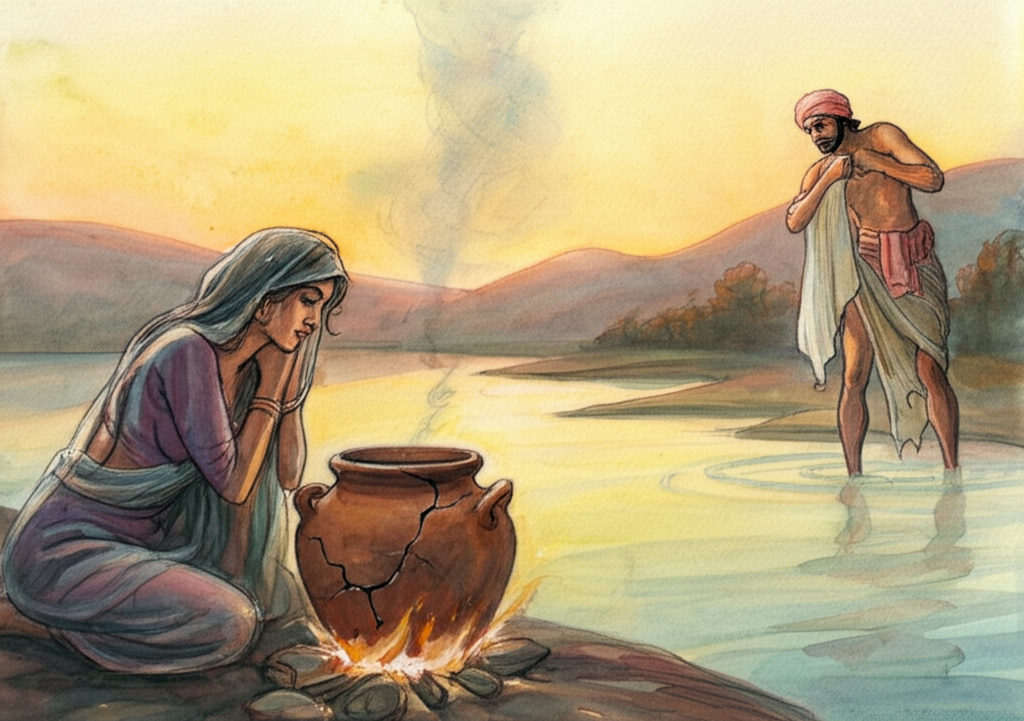
They kept walking, and the next day they came to another jungle where they saw two pigeons. The King took some grass and sticks and made a bow and arrow. He shot the pigeons with them, and the Queen plucked their feathers and cleaned them. Her husband and she made a small fire, put the pigeons in their pot, and set the pot on it. There was a pond nearby. “Now I’ll go take a bath,” said the Queen. “I haven’t taken a bath in days. When I come back, we can eat the pigeons.” So she went to take a bath, and the King sat down to watch the pigeons. After a while, he thought, “If I leave the pot closed, the birds will dry up and burn.” So he took off the lid, and the pigeons flew away out of the pot! He knew right away what had happened with the fish yesterday, and he didn’t say anything until the Queen came back. “I ate the pigeons just like you ate the fish yesterday,” he told her. The Queen understood what had happened and knew that the King knew about the fish.
So they kept walking. As they walked, the Queen remembered a friend of theirs, an oil seller named Ganga Teli, who was a very important man, almost like a King. “Let’s go to Ganga Teli if we can walk that far,” she said. “He’ll be good to us.” He lived far away. When they got to him, Ganga Teli recognized them right away. “What happened?” he asked. “You used to be a great King and Queen, why are you so poor and dressed like poor travelers?” “It’s God’s will,” they answered. Ganga Teli didn’t think they were worth much now that they were poor. He didn’t send them away, but he gave them a bad room to live in, a bad bed to sleep on, and such bad food that they couldn’t even touch it, even though they were hungry. “When we were rich,” they said to each other, “and we came to visit Ganga Teli, he treated us like friends. He gave us beautiful rooms to live in, beautiful beds to sleep on, and delicious food to eat. We can’t stay here.”
So they left, very sad. They walked for a whole week and didn’t have any food. Finally, they came to another country whose King, King Bhoj, was one of their friends. King Bhoj was very kind to them. “What brought you here like this? How did you become so poor?” he asked. “What happened to you?” “It’s God’s will,” they answered. King Bhoj gave them a beautiful room to live in and told his helpers to cook them the best dinner they could. The helpers did this and brought the dinner into King Harichand’s room, set it down, and left. Then he and the Queen put some of the food on their plates, but before they could eat anything, the food in the dishes and on their plates turned into wriggling worms! So they couldn’t eat it. They felt very sad. But they didn’t say anything, they just prayed to God. They buried all the food in a hole they dug in the floor of their room.
Now, King Bhoj’s daughter had left her gold necklace hanging on the wall of the room where King Harichand and Queen Bahan were staying. At night, when King Harichand was asleep, the Queen saw a crack appear in the wall and the necklace disappeared into the crack. Then the wall closed up again! She woke up her husband right away and told him what she had seen. “We should leave quickly,” she said. “They won’t find the necklace tomorrow, and King Bhoj will think we stole it. It won’t do any good to break open the wall to find it.” The King got up right away, and they left again. When King Bhoj didn’t find the necklace, he thought that King Harichand and Queen Bahan had stolen it.
They kept walking until they came to a country belonging to another friend, King Nal. But they were ashamed to go to his palace. The three weeks were almost over, only two days left. So the Queen said, “In two days we can eat again. Go into the jungle and cut grass and sell it in the market. We can get a little money and buy some food.” The King went into the jungle, but he had to pull up the grass with his bare hands. He worked half the day, then sold the grass in the market for a little money. They were able to buy food. They prayed to God and cooked it, and since the three weeks were over, they were allowed to eat it.
They stayed in King Nal’s country and lived in a small house they rented in the market. Every day, King Harichand went to the jungle to pull up grass and sell it in the market for a little money. The Queen saved a little money whenever she could. After two years, they had saved enough to buy a hook that grass cutters use. Now the King could cut more grass. Soon, the Queen was able to buy some colorful silk thread in the market.
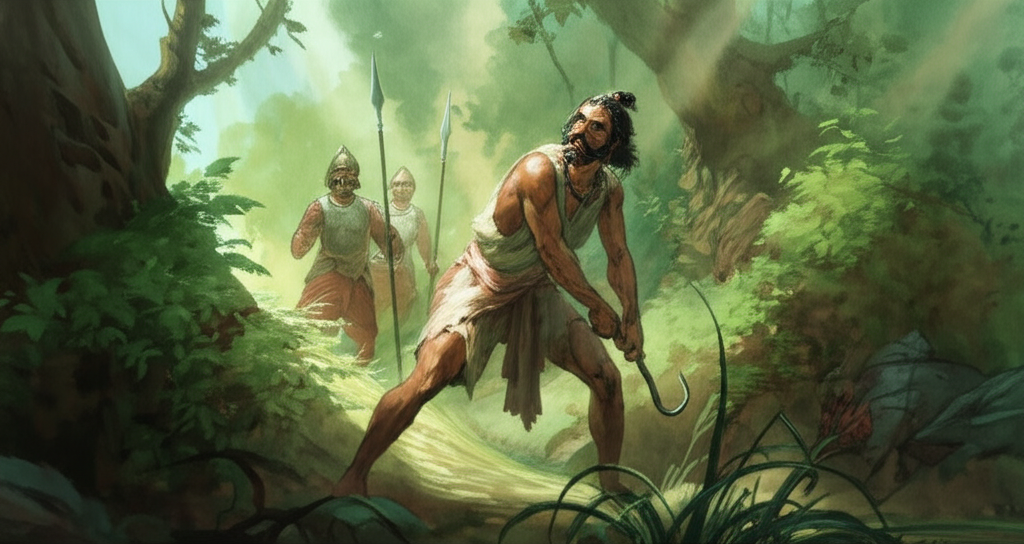
Her husband went to cut grass every day, and she stayed home making horse collars with the silk thread. Four years after they bought the hook, she had four of these horse collars ready. She took them to King Nal’s palace to sell. It was the first time she had gone there, because she and her husband were ashamed to see King Nal. Their poor travelers’ clothes had turned into rags, and they had only been able to buy bad, cheap clothes in their place, because they were so poor.
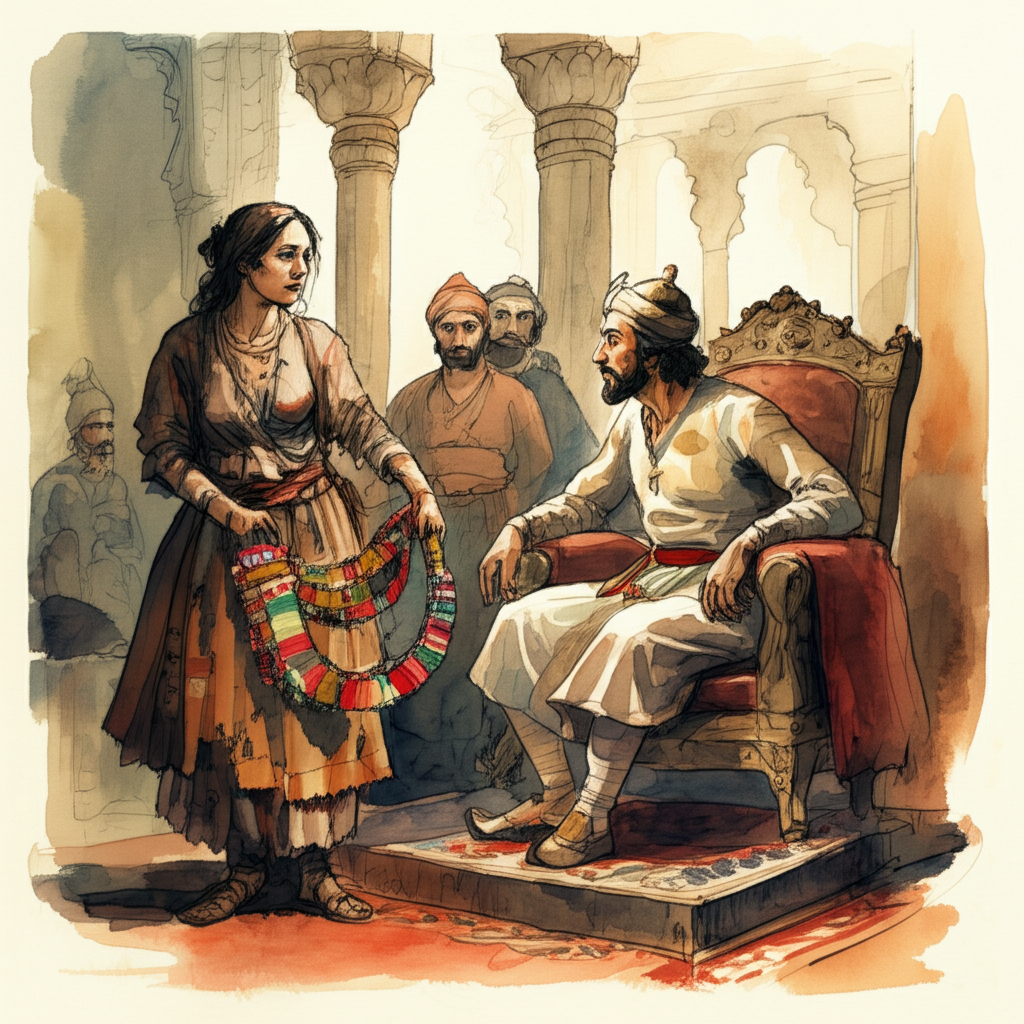
“These are beautiful horse collars!” said King Nal’s horse trainers. They took them to show their King. As soon as he saw them, he said, “Where did you get these horse collars? Who wants to sell them?” He knew that only one woman could make such horse collars, and that woman was Queen Bahan. “A very poor woman just brought them here,” they answered. “Bring her to me,” said King Nal. So the helpers brought Queen Bahan to him. When she saw the King, she started crying. “What happened to you? Why are you so poor?” said King Nal. “It’s God’s will,” she answered. “Where is your husband?” he asked. “He’s cutting grass in the jungle,” she said. King Nal called his helpers and said, “Go to the jungle. You’ll see a man cutting grass. Bring him to me.” When King Harichand saw King Nal’s helpers coming to him, he was very scared. But the helpers took him and brought him to the palace. As soon as King Nal saw his old friend, he grabbed his hands and started crying. “King, what happened to you?” he said. “It’s God’s will,” said King Harichand.
King Nal was very good to them. He gave them a palace to live in, helpers to take care of them, beautiful clothes to wear, and good food to eat. He went with them to the palace to make sure everything was perfect for them. “Today,” he said to the Queen, “I’ll eat dinner with your husband. You have to cook me the same kind of dinner you used to cook for me when I visited you in your own country.” “Okay, I’ll cook it for you,” said the Queen. But she was scared. She thought, “The King is so kind, and everything is so good for us, that I’m sure something bad is going to happen.” But she prepared the dinner and told the helpers how to cook it and serve it. First, she prayed to God and asked him to have mercy on her and her husband. The dinner was very good, and nothing bad happened to anyone. They lived in the palace King Nal gave them for four and a half years.
Meanwhile, the farmers in King Harichand’s country had been plowing and digging up the land all those years, even though it hadn’t rained at all and the ground was hard and dry. Now, just when the King and Queen had been living in King Nal’s palace for four and a half years, a powerful god was walking through King Harichand’s country. He saw the farmers digging up the ground and said, “What’s the point of digging? It’s not going to rain!” “No,” said the farmers, “but if we don’t keep plowing and digging, we’ll forget how to do our work.” They didn’t know they were talking to a god, because he looked like a regular man. “That’s true,” said the god. He thought, “The farmers are right! If I don’t keep playing my horn, I’ll forget how to play it at all!” So he took out his deer horn, which looked like the ones some holy men use, and blew on it. Now, when King Harichand had chosen the twelve years with no rain, God had said, “It won’t rain in King Harichand’s country until this god blows his horn!” The god had completely forgotten about this. He blew on his horn even though there were still eighteen months of the twelve years to go. The moment he blew, the rain came down! The whole country went back to the way it was before the dry spell started. Also, the moment it rained, everything in King Harichand’s palace went back to normal. All the men and women came back to life! So did all the animals. The gold and silver weren’t charcoal anymore, they were gold and silver again! God wasn’t angry with the god for forgetting that he had said the dry spell should last for twelve years and that it would rain when he blew his horn. “If the god wanted to blow his horn,” said God, “it doesn’t matter that there were still eighteen months of the dry spell to go.” As soon as they heard the rain had come, all the people who had left King Harichand’s country because of the dry spell came back.
One of the King’s helpers, the chief of police, was very eager to find the King and Queen when he came back to life. But he didn’t know where to look for them.
Meanwhile, Queen Bahan had a dream from God. In the dream, an angel said to her, “It’s time for you and your husband to go back to your country.” She told her husband about the dream. King Nal gave them horses, elephants, and camels so they could travel like Kings and Queens back to their home. He even went with them. They found everything in order in their own palace and all through their country. They lived very happily after that. But the Queen said to King Harichand, “If you had just done what I told you and said you would give me to the traveler, none of this bad stuff would have happened to us!”
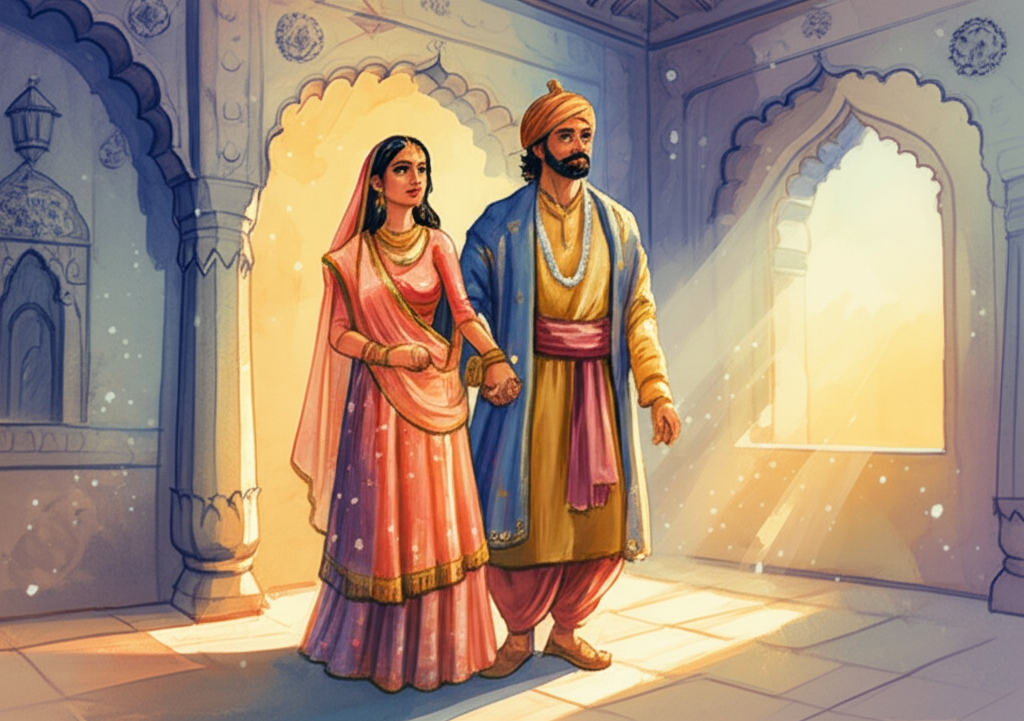
Later, they went to visit King Bhoj again. They slept in the same room as they had when they were poor and miserable. During the night, they saw the wall open up! The necklace came out of the crack and hung itself up again, and the wall closed up. The next day, they showed the necklace to King Bhoj. They said, “We ran away from you last time because of this necklace.” They told him everything that had happened to it.
But they never went near Ganga Teli again.